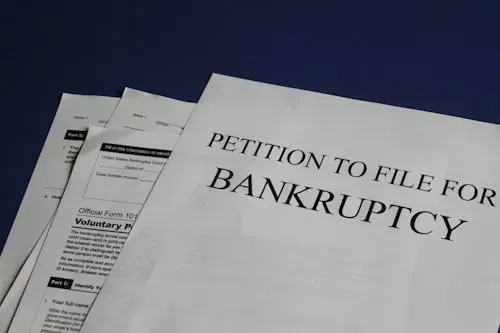Rebuilding Your Credit and Financial Future After Bankruptcy
Bankruptcy might feel like hitting a financial reset button. While it does come with its challenges, it also opens a doorway to rebuilding a stronger, more stable financial future. If you're standing at this crossroads, wondering how to move forward, you're not alone.
This blog is designed to walk you through the essential steps of picking up the financial pieces post-bankruptcy. From understanding the impact on your credit to taking tangible steps towards recovery, we'll provide you with actionable advice, backed by the latest data and expert insights. Let's embark on this journey to financial recovery, armed with knowledge and a clear path forward.
Understanding Your Credit After Bankruptcy
The aftermath of bankruptcy can seem daunting, especially when it comes to your credit score. Here’s what you need to know:
- Immediate Impact: Bankruptcy can significantly lower your credit score. Chapter 7 stays on your report for 10 years, while Chapter 13 sticks around for 7 years. However, the impact lessens over time.
- Credit Score Recovery: Rebuilding starts immediately. The journey varies, but many find their scores gradually improving within 2 years, provided they adopt sound financial habits.
- Review Your Credit Report: Post-bankruptcy, it's crucial to get a copy of your credit report. Check for inaccuracies, ensuring discharged debts are correctly listed to avoid further damage to your score.
Understanding the scope of bankruptcy's impact on your credit is the first step towards rebuilding. Remember, the path to recovery is a marathon, not a sprint. With patience and the right strategies, you can gradually restore your creditworthiness.
First Steps to Rebuilding Credit
After understanding the impact of bankruptcy on your credit, the next step is to actively start rebuilding it. Here’s how to begin:
Review and Understand Your Credit Report
- Accuracy Check: Ensure all information is up-to-date and accurately reflects your bankruptcy discharge. Incorrect listings can hinder your recovery.
- Annual Reports: Utilize free annual credit report services to monitor changes and improvements in your score.
Establish a Budget
- Budgeting: Create a realistic budget that accounts for all your expenses. Sticking to a budget will help prevent falling back into debt.
- Emergency Fund: Start building an emergency fund. Even a small monthly contribution can provide a buffer against future financial shocks.
Financial Planning
- Set Goals: Define clear, achievable financial goals. Whether it's saving for a down payment on a house or preparing for retirement, having goals can guide your financial decisions.
- Educate Yourself: Financial literacy is key. Seek resources and workshops to better understand credit, investing, and debt management.
Taking these initial steps post-bankruptcy is about laying a strong foundation for your financial future. By adopting disciplined financial habits early on, you set the stage for a robust credit score recovery and a healthier financial outlook.
Strategies for Credit Improvement
Once you've laid the groundwork by understanding your credit post-bankruptcy and establishing a solid budget, it's time to actively work on improving your credit score.
Here are strategic moves to consider:
Start with Secured Credit
- Secured Credit Cards: These cards are backed by a deposit you make upfront, which usually serves as your credit limit. They're a great way to demonstrate responsible credit use without the lender taking on much risk.
- Credit Builder Loans: Offered by some credit unions and banks, these loans hold the amount borrowed in a bank account while you make payments. Successfully paying off the loan boosts your credit score, plus you get access to the loan amount at the end.
Use Credit Wisely
- Low Utilization: Try to use a small portion of your available credit. Keeping your credit utilization rate below 30% can positively impact your credit score.
- On-Time Payments: Paying your bills on time is crucial. Set up reminders or automatic payments to ensure you never miss a due date.
Diversify Your Credit
- Mix of Credit: Having a mix of credit types (like a credit card, auto loan, or student loan) can positively affect your credit score, showing lenders you can handle various types of credit responsibly.
Improving your credit score after bankruptcy is a process that requires patience and consistent effort. By strategically using credit to show positive borrowing habits, you can gradually increase your score and improve your financial standing.
Legal and Professional Assistance
Navigating financial recovery post-bankruptcy doesn't have to be a solo journey. Getting the right legal and professional advice can be a game-changer in rebuilding your credit and financial future. Here’s how to leverage professional help:
Financial Advisor or Credit Counselor
- Credit Counseling: A reputable credit counselor can provide personalized advice on managing debt, building a budget, and improving your credit score. Look for accredited professionals through national organizations.
- Financial Planning: A financial advisor can help you set long-term financial goals and develop strategies to achieve them. They can offer insights on saving, investing, and managing your finances in a way that supports credit improvement.
Legal Advice
- Bankruptcy Attorney: If you have lingering legal questions post-bankruptcy or need advice on specific financial actions, consulting with a bankruptcy attorney can provide clarity. They can also guide you on any legal steps you can take to protect your assets and ensure your financial actions post-bankruptcy are sound.
Finding the Right Help
- Do Your Research: Check credentials, read reviews, and perhaps most importantly, schedule a consultation to ensure they understand your specific situation and goals.
- Free Resources: Many non-profit organizations offer free or low-cost credit counseling services. These can be a great starting point if you're looking for guidance but are concerned about costs.
Leveraging professional assistance is about more than just getting advice; it's about building a team that supports your financial recovery. With the right experts by your side, you can navigate the complexities of rebuilding your credit with confidence.
Conclusion
Embarking on the journey to rebuild your credit and financial standing after bankruptcy is both challenging and rewarding. It requires patience, discipline, and a proactive approach to managing your finances.
By understanding the impact of bankruptcy on your credit, taking the first steps towards financial stability, strategically improving your credit score, and seeking professional guidance, you're laying down the foundations for a brighter financial future.
Call to Action
If you're on the path to financial recovery post-bankruptcy and found these tips helpful, consider exploring further resources and professional advice tailored to your situation. Your journey to rebuilding your credit and financial future is unique—continue educating yourself, stay motivated, and never hesitate to seek support. Share your experiences and successes in the comments below to inspire others on the same path. Together, we can navigate the challenges and celebrate the milestones towards financial recovery.
If you're navigating the complexities of financial recovery post-bankruptcy, the Smith Law Group is here to help. With a deep understanding of bankruptcy, real estate law, and civil litigation, our team in Farmington Hills, MI, is committed to guiding you towards financial stability. Our expertise spans across Detroit and various counties, ensuring comprehensive support tailored to your unique situation. Let the Smith Law Group empower you with the knowledge and legal advice you need to rebuild your credit and secure your financial future. Reach out today for a consultation and take the first step on your journey to recovery.










